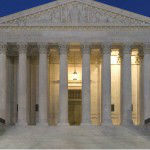What Do Citizens United and the Affordable Care Act Have in Common? Supreme Court Likely to Consider Next Term

The Affordable Care Act is likely headed back to the U.S. Supreme Court next term, which starts in October. While the latest round of challenges involve the law’s contraception mandate, the Court’s decision may be influenced by Citizen’s United, the Court’s controversial campaign finance ruling.
What do these cases have in common? The answer boils down to the First Amendment.
Most recently, the 3rd U.S. Circuit Court of Appeals upheld the contraception mandate, finding that it does not violate the Religious Freedom Restoration Act and the Free Exercise Clause of the First Amendment of the United States Constitution. In deciding Conestoga Wood Specialties Corp et al v. Secretary of the U.S. Department of Health and Human Services et al., the court analyzed the Supreme Court’s 2010 decision in Citizens United v. Federal Election Commission as it applies to the First Amendment rights of corporations.
While the appeals court acknowledged that the United States has “a long history of protecting corporations’ rights to free speech,” it held that such a precedent does not exist for religious freedom.
“We simply cannot understand how a for-profit, secular corporation – apart from its owners – can exercise religion,” Judge Robert Cowen wrote. “A holding to the contrary … would eviscerate the fundamental principle that a corporation is a legally distinct entity from its owners.”
“We are not aware of any case preceding the commencement of litigation about the Mandate, in which a for-profit, secular corporation was itself found to have free exercise rights,” the justice further explained.
Interestingly, the 10th Circuit Court of Appeals reached the opposite conclusion in deciding a challenge brought by Hobby Lobby Stores, Inc. After examining Citizens United, it held that corporations could assert religious rights.
The novelty of the issue and the circuit split all but guarantees the case will make it to the Supreme Court.
Previous Articles
SCOTUS Decision in Bowe v. United States Is First of the 2026 Term
by DONALD SCARINCI on February 5, 2026
In Bowe v. United States, 607 U.S. ___ (2026), the U.S. Supreme Court held that Title 28 U.S.C. § ...
SCOTUS Rules State Can’t Immunize Parties from Federal Civil Liability
by DONALD SCARINCI on January 29, 2026
In John Doe v. Dynamic Physical Therapy, LLC, 607 U.S. ____ (2025) the U.S. Supreme Court held that...
Supreme Court to Address Racial Discrimination in Jury Selection
by DONALD SCARINCI onWhile the U.S. Supreme Court has concluded oral arguments for the year, it continues to add cases t...
The Amendments
-
Amendment1
- Establishment ClauseFree Exercise Clause
- Freedom of Speech
- Freedoms of Press
- Freedom of Assembly, and Petitition
-
Amendment2
- The Right to Bear Arms
-
Amendment4
- Unreasonable Searches and Seizures
-
Amendment5
- Due Process
- Eminent Domain
- Rights of Criminal Defendants
Preamble to the Bill of Rights
Congress of the United States begun and held at the City of New-York, on Wednesday the fourth of March, one thousand seven hundred and eighty nine.
THE Conventions of a number of the States, having at the time of their adopting the Constitution, expressed a desire, in order to prevent misconstruction or abuse of its powers, that further declaratory and restrictive clauses should be added: And as extending the ground of public confidence in the Government, will best ensure the beneficent ends of its institution.





